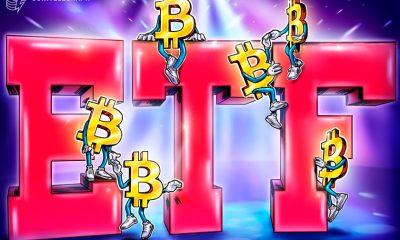Bitcoin
Bitcoin Gains Ground on Gold, Bolsters Claim as the Asset of Tomorrow

“In the world of decentralized finance, stablecoins are a real threat to mutual funds and ETFs. And ETFs backed by gold might be disrupted by stablecoins that are backed by gold,” said one expert
Is gold faltering as a safe haven? A Coinbase blog post from May 1 suggested that several months into the COVID-19 pandemic, gold’s market efficiency vis-à-vis Bitcoin (BTC) could be slipping. “Bitcoin and gold are fundamentally similar as scarce and globally accessible units of value,” the report noted, but recent “challenges” in the gold market “reveals Bitcoin’s distinct advantage over gold.”
The event that provoked this observation was a market supply squeeze. As Coinbase recounted: “According to the LA Times on March 24, ‘The gold market in New York is facing a historic squeeze as the global pandemic chokes off physical trading routes at the same time that investors are piling into the metal as a safe haven.’” Investors and bankers were said to be facing severe shortages of gold bars and coins.
A chink in gold’s armor?
Is the world’s most popular store of value losing its grip? And if so, will investors and gold bugs swarm to BTC as the new hedge in times of crisis? On the matter of the supply squeeze, some were dubious. Campbell Harvey, a J. Paul Sticht professor of international business at Duke University, told Cointelegraph: “I’m not concerned about a so-called short squeeze. You certainly don’t see it in the data, and people have been talking about this for over a month.”
Kevin Dowd, a professor of finance and economics at Durham University in the United Kingdom, commented to Cointelegraph: “I would imagine these physical delivery problems will soon be sorted out. We bought some gold recently, and there was a delivery delay, but only three weeks. I don’t see much connection between such delays and Bitcoin.”
The Coinbase report also suggested that the coronavirus pandemic has had a minimal impact on Bitcoin mining: “Bitcoin’s global mining ecosystem seems resilient,” in contrast to gold production, where “gold refineries, miners, and supply chains have been disrupted.” In BTC’s favor: “Bitcoin does not rely on fragile physical supply chains and is truly globally accessible.” Dowd, a BTC skeptic, wasn’t persuaded by this claim either, telling Cointelegraph:
“I am pretty sure it [BTC] will run into mining problems down the road, as the amount of Bitcoin mined approaches its limit. What will happen as mining gets exhausted? Do we really think that the price will become stratospheric to compensate miners, or do you think they will eventually be forced out?”
The Coinbase report emphasized BTC’s relative scarcity, particularly in light of the upcoming halving, noting that “Bitcoin’s rate of new supply is ~3.6% per year and will soon drop to ~1.7% on May 12th, setting it on par with gold’s historic scarcity.” It referenced advantages, too, in regard to transaction times and fees. A BTC transaction valued at more than $1 billion was sent in September 2019 for a fee of only around $700, for instance. The price to send a comparable amount of gold would have been exorbitant.
Related: BTC Miners Expect Bitcoin Price to Surpass $12K After Reward Halving
The report concluded that when compared by depositing, transporting or withdrawing capabilities against gold, “Bitcoin is at a technological advantage. And if current market conditions continue, Bitcoin may yet distinguish itself further.”
Gold still rules
The big question, however, is whether BTC will ever replace gold as a store of value, and here, Bitcoin’s continued volatility remains a key obstacle. John Griffin, who holds the James A. Elkins centennial chair in finance at the University of Texas, told Cointelegraph: “Gold supply chains being disrupted may make it hard to transact in gold, but shouldn’t hurt it much as a store of value.” He added that in the current crisis, “BTC fell when the market fell and mostly rallied as the market rallied. So, when it counted to have a hedge, it was a poor one.”
Duke’s Harvey concurred, saying that the volatility of gold is about 15% on an annualized basis, which is about the same as the equity market, meanwhile, “the volatility of cryptocurrency is huge. It’s four or five times the volatility of gold. This is not something I would call a safe haven asset.”
However, BTC does enjoy certain advantages since it is teleportable, which makes it useful in arbitrage, for instance, as Harvey acknowledged. A trader looking to exploit gold price differences between New York and Europe, for example, might be tempted to ship some physical gold from Europe for sale to the United States — but that would probably take some time, and in that interval, the price difference could vanish. Crypto doesn’t have that problem. “There’s no physical shipment. Arbitrage is much more straightforward for something that is a pure digital asset — that’s a clear advantage,” said Harvey.
Gold in a crypto form?
If BTC isn’t likely to become a useful store of value in the near future, that doesn’t necessarily mean that cryptocurrencies have no role to play as a hedge in future crises, though. This past year, gold-backed stablecoins have emerged on the market, gaining Harvey’s attention. He further commented: “You delegate to somebody else the warehousing of the precious metal and then you’ve got a coin that is collateralized that you can transact at a very low cost, quickly and securely.”
The market for gold-pegged stablecoins has grown 16-fold in the past 12 months — from $10 million to more than $160 million in value — according to a recent research report from Blockchain.com.
“Innovations in blockchain technology are quietly shifting the paradigm of physical gold ownership,” said Matthew Alexander, a compliance analyst at Tether (USDT), in a recent Cointelegraph article, adding that gold-backed stablecoins can fulfill the economic purpose of physical gold ownership while overcoming many of the traditionally associated challenges — for example, “stores of gold must be physically safeguarded against theft,” not an issue with gold-backed tokens.
Three stablecoins currently dominate the market — Tether Gold (XAUT), $87 million in market value; PAX Gold (PAXG), $44 million in market capitalization; and DGLD token, with $25 million — accounting for 94% of the gold-token market by value, according to the Blockchain.com report. DGLD was only launched in October by a consortium that included CoinShares and MKS, as well as Blockchain.com. However, the new gold stablecoins are much like gold exchange-traded funds, or ETFs, said Harvey, adding:
“The gold stablecoin needs to have a vaulting for the coin, and it needs to have an audit, and security, and things like that, but the advantage of the gold stablecoin is that you can use it for instant transactions. It’s much more stable than Bitcoin or Ethereum, and I see this as a growth area.”
Not everyone is convinced, as Mati Greenspan, the founder of Quantum Economics, asked Cointelegraph: “Why would anyone prefer holding a gold-pegged stablecoin to physical gold?” Maybe for security or because it’s teleportable? “There might be a slight advantage to holding tokenized gold over holding paper gold in a brokerage account, but that really depends on the level of trust you have with the issuer of each one,” Greenspan answered. “Physical gold trumps both by far. If the [electric] power goes out, neither tokens nor brokerage gold will do you any good.”
University of Texas’s Griffin sees potential in gold-backed tokens. “A stablecoin that is audited and fully backed by dollars or gold could be a good store of value,” he told Cointelegraph, adding:
“But traders already have gold ETFs that are quite liquid, so it is not clear that a stable crypto would be that preferable — unless it became widely adopted, fully audited and with lower transaction costs.”
Gold ETFs are not going away anytime soon, Garrick Hileman, the head of research at Blockchain.com, told Cointelegraph, and they do offer some advantages over gold-backed tokens, such as greater liquidity and a footing with regulators. Meanwhile, “Gold ETFs cannot be easily used for everyday global transactions as a currency, traded 24/7, or operate as programmable cryptocurrency” — e.g., being integrated into smart contract lending or borrowing platforms.
A new dialectic?
Overall, has there been any shift regarding the balance of power between Bitcoin
and Gold — or even stablecoins and gold — as a result of the current global crisis? Harvey opined on the matter:
“In the world of decentralized finance, I see that stablecoins are a real threat to mutual funds and ETFs. And ETFs backed by gold might be disrupted by stablecoins that are backed by gold.”
Hileman, for his part, suggested the debate might have to be reframed. Rather than Bitcoin vs. gold, it might soon become Bitcoin vs. gold-backed tokens — that is, a competition within the crypto world. He shared with Cointelegraph:
“The rise of gold-backed tokens does present some intriguing hard-asset competition to Bitcoin.[…] In contrast with Bitcoin, gold is a much more mature and liquid asset. Gold has greater regulatory clarity and is widely owned by central banks. The fact that gold can now be owned in crypto form makes it [i.e., gold] much more competitive with Bitcoin.”
A new sort of dialectic may be emerging, in this view, where gold (thesis), gives rise to its reaction, Bitcoin (antithesis), and where the tension between the two is resolved by gold-pegged stablecoins (synthesis). However, the gold-backed token market is still minuscule compared with Bitcoin, let alone gold. “The safe answer,” said Dowd, “is it’s too early to say.” This is all really just so much tea leaf reading. “Long term, I am a gold bull and a BTC bear. Short term: Who can say?

















